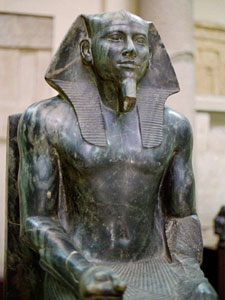
Khafre (or Khafra, “appearing like Re”) was the son of Khufu (probably by Queen Henutsen), and the brother of his predecessor Djedefre. His chief wives were Queen Khamaerernebty I (the mother of Menkaure, his successor) and Queen Meresankh III (daughter of his brother Crown Prince Kawab). He had a number of sons including: Menkaure, Nebemakhet, Misuerre, Khenterka, Duaenre, Nikawre (Nekure), and Sekhemkare. We also know of a couple of his daughters: Khameremebty II and Shepsestkau.

Manetho (who called him Suphis II) claims he reigned for sixty-six years, while Herodotus (who knew his as Chephren) credited him with a fifty-six year reign. However, it is generally agreed that his reign actually amounted to between twenty-four and twenty-six years because the highest regnal year mentioned in the Will of Prince Nekure (mastaba G 7650) is the “Year of the 13th occurrence” of the cattle count (which was thought to be bi-annual). The section where his name should be on the Turin Kings List is blank but his reign is confirmed as twenty-four years.
He built the second largest pyramid (which he named “Khafre is Great”) at Giza and is often credited with building the Sphinx, and it is suggested that the face of the Sphinx models its creator. He also left many beautifully crafted diorite statues of himself.
Reputation
Like his father Khufu, Khafre is described as a cruel king by Herodotus (although he does not go into much detail regarding his exploits). There are, however, rumours that his accession to the throne was problematic.
Khafre was the child of a lower ranked wife and it is sometimes suggested that he murdered his predecessor Djedefre in order to gain the throne. Proponents of this theory note that Djedefre did not choose to build his monument at Giza, instead locating it at Abu Rawash, and suggest that Djedefre usurped the throne before Khafre seized power from him. However, there is no evidence to support this conjecture and nothing in the contemporary records to confirm why Djedefre chose an alternate site or how his reign ended.
Whether he was a beneficent ruler or not, Egypt certainly prospered under his reign and there is evidence of trade or diplomacy with Byblos and Ebla (Tell Mardikh in Syria).
Pharaoh’s Names
- Manetho; Suphis II
- Herodotus; Chephren
- Horus Name
- Userib “Horus, who is strong of heart”
- Nebty Name
- Userem “The one who is strong with the Two Ladies”
- Golden Horus Name
- Netjer-nub-sekhem “The Golden Falcon is Powerful”
- Prenomen
- Weserib Khafre “Appearing Like Re, Strong of Heart”
- Nomen
- Khafre “Appearing Like Re”
Copyright J Hill 2010